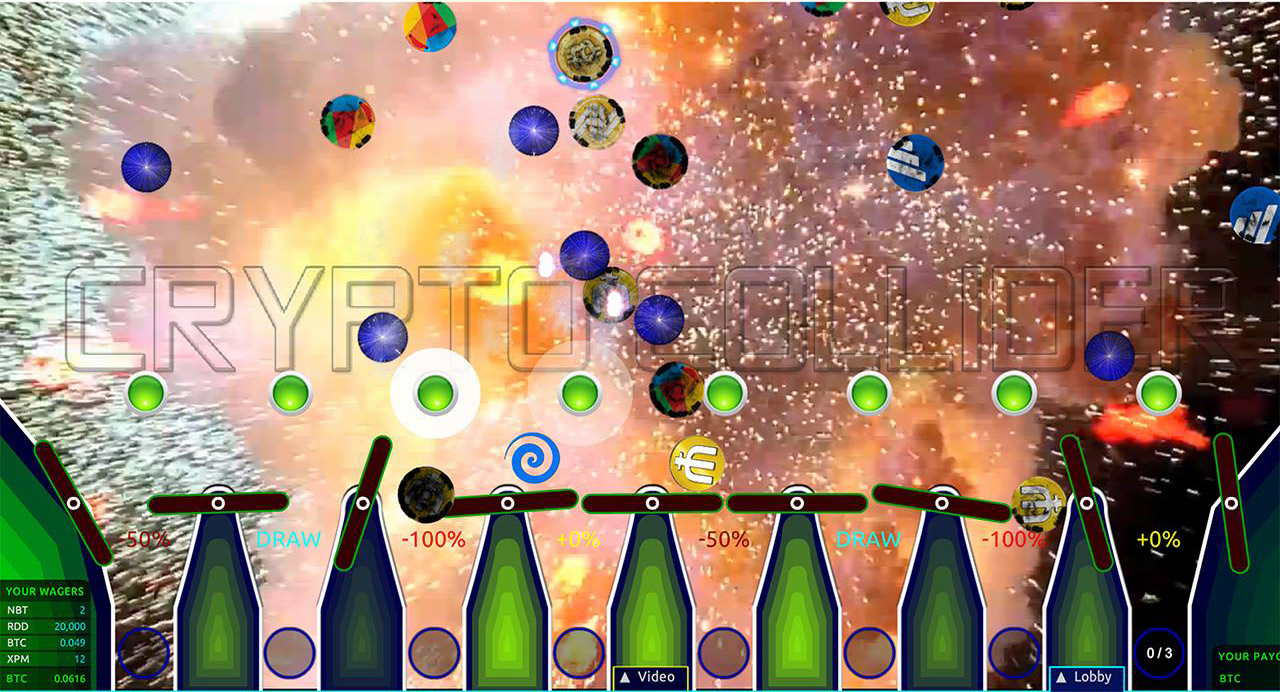If a day trader and a gamer had a lovechild, it would be Crypto Collider, the new “e-money sport” that lets peers compete against one another to “hedge” their crypto holdings.
Crypto Collider uses what its creators call a “gamechain,” which is a permanent public ledger of all game activity similar to a blockchain. “The game itself is a visualization of this data,” says Clint Jones, founder of the game. He’s built in support for Bitcoin, Peercoin, NXT, Primecoin, Dogecoin, Litecoin and Dash.
Game Play
To enter the “Collider Arena,” a player starts with some of a coin she'd like to hedge out of. The game then breaks up that coinage into smaller amounts to be used in “coin-throws.” The user makes a coin-throw by moving her mouse, or gliding her finger across her touch screen.

“Each coin-throw has a different amount staked on it,” explains Jones. “The sum dollar value of that throw determines its in-game 'weight' in both the physics calculation (influence on the game objects) and percentage of winnings (when they win).” He continues:
“The end result is a first-of-its-kind Bitcoin skill-based hedging game that is exciting and unpredictable while also fair and winnable with many second and third chances to profit.”
Technicalities, Incentives & Live Feeds
Crypto Collider generates its “gamechain” using a client-side “physics code” for a logarithm, publishing the live results of play to the chain. In addition to coins won from other players, in-game points are also given, which can be converted to Collider Coin, the game's in-house, dividend-paying cryptocurrency.
And for those who'd like to play while they work, Jones says:
“Crypto Collider is a great tool for monitoring industry news and market data. A news panel aggregates multiple major Bitcoin news feeds and data on all supported coins including price, difficulty, supply and hash rate.”
We asked Jones to tell us more about the game.
Cointelegraph: What was the inspiration for the game?
Clint Jones: It was basically realizing how day trading is much like a game, but just a really technical and inhospitable one. Why not just make it a really approachable and entertaining one? Also what about doing something with all the coins other than just buying and selling? And then those old silver coin carnival games with the sliding table — that I used to love as a kid — came to mind, and I thought, why not put them together? It just grew from there.
CT: Do users need to do anything to start game play?
CJ: It's really easy for players to get started. Email is optional (but recommended so you can password reset), and we provide a free deposit for each new player so they can get started straight away. There's also a live “chat lobby” there to help if new players have any questions.
“If the top ten [players] can live off their weekly payouts as professionals one day, I think that would be really cool.”
CT: How do you think this game will affect the crypto world?
CJ: I hope it will be positive and supportive of the coins and all their users, providing a new useful tool to existing traders and a fun engaging introduction to new crypto users. I simultaneously hope to see hedging of all players across a wider range of coins.
If the top ten [players] can live off their weekly payouts as professionals one day, I think that would be really cool.
CT: How does Crypto Collider make money at this time, if at all?
CJ: A fee is applied to the coins that go into the loose holes and then become the winnings for the players with coins in the win holes. This works out to approx 1% of overall game value (depending on the game's win/lose percentages). Also 100% of the game fee is redistributed proportionately to all Collider Coin holders, which works like a little interest on each game for those players.
Crypto Collider requires Adobe Flash and is now live.
